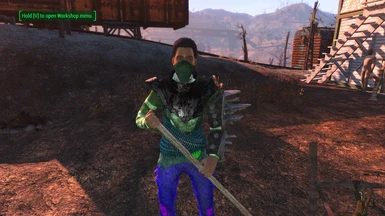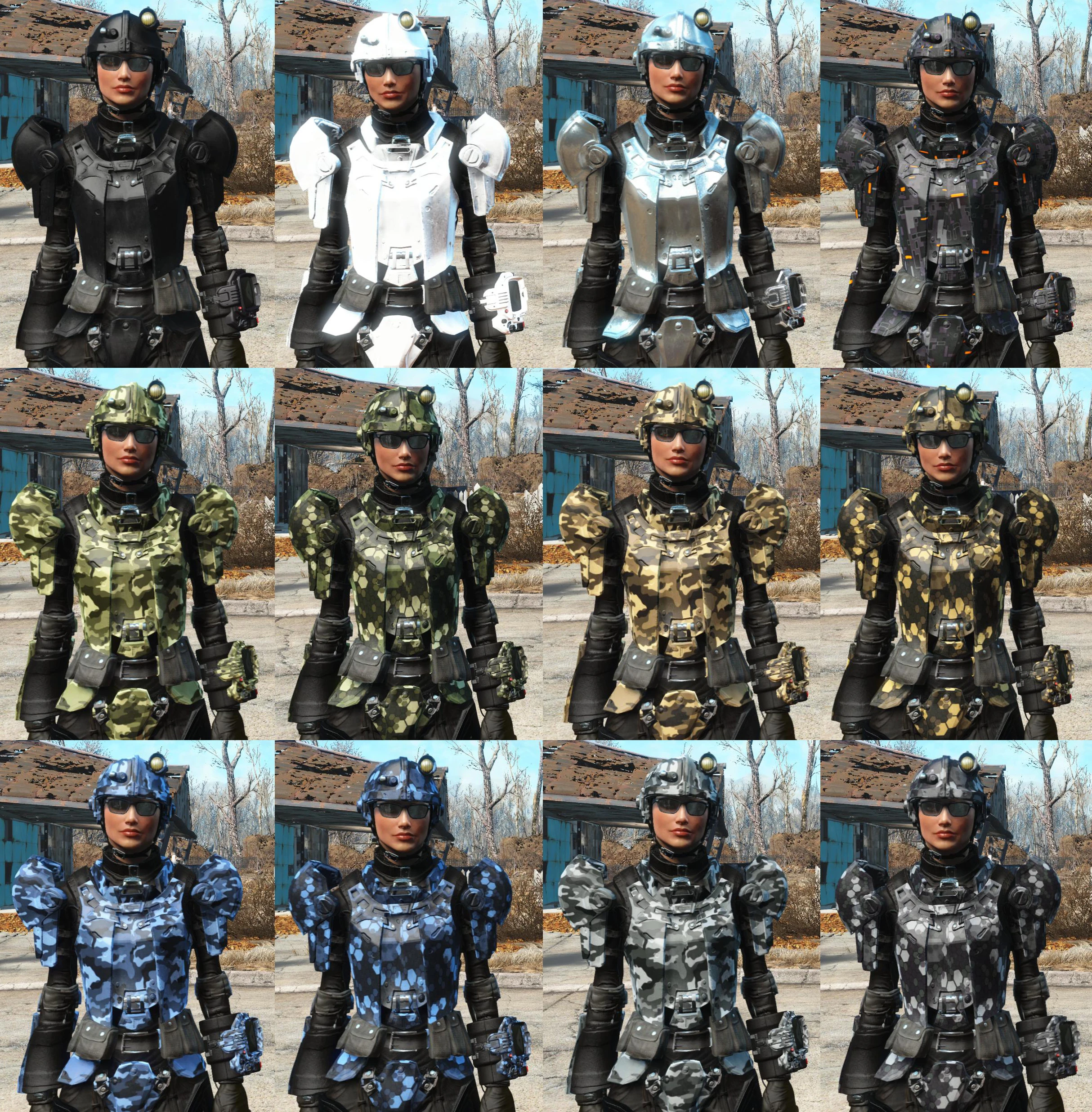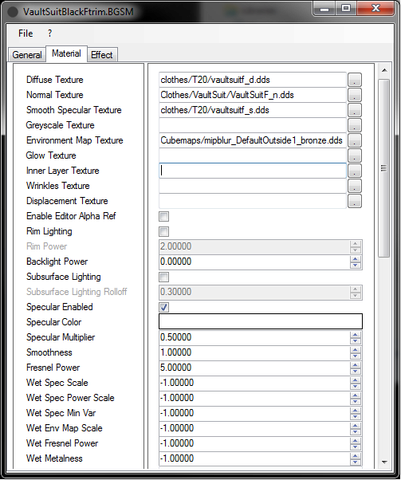For Fallout 4 on the Xbox One, a GameFAQs message board topic titled 'Mod that allows changing clothing/armor colors?' Here’s a good place to find Gunners in Fallout 4: Advertisement Getting a full set of Combat Armor might take a while, so you’ll probably have to wear different pieces from different sets as.
- Fallout 4 Change Armor Color Monster Hunter World
- Fallout 4 How To Change Armor Color
- Best Fallout 4 Armor
- Fallout 4 How To Change Armor Color
- Fallout 4 Change Power Armor Color
What the Fallout 4 armour resistances mean and how to change them with modifications
You can't skip merrily around the Commonwealth without any protection - or at least, if you did you wouldn't last long - so understanding your armour and what kind of defense it affords you is pretty important, hence we've done a guide on armour and how you can modify it. If you're more of power armour type then don't worry: we've done a separate guide for that too.
How armour slots work in Fallout 4
When you're getting dressed in Fallout 4 you have six slots to fill: left leg, left arm, right leg, right arm, torso, head, and, underneath all that, a base layer. The base layer is more or less a set of clothes that you can strap other bits of armour on top (for example, the Vault 111 uniform you're wearing when you first leave the vault) so you're not just wearing your pants. You can then fill the other slots with a combination of any separate bits you like from the armour you pick up. It's worth noting that you can equip more than one thing on your head, so if you want to rock a postman's hat with a bitchin' pair of sunglasses you can. Don't let anyone tell you it's not a relevant choice.
There are some bits of kit that are complete outfits and will fill up most or all of your armour slots, like the Silver Shroud costume. You might want to keep different sets of clothes for different occasions. Some of the nicer suits and dresses make you more charismatic, but aren't great in a tactical firefight situation.
Fallout 4 Change Armor Color Monster Hunter World
How armour stats work in Fallout 4
Armour in Fallout 4 has three damage resistance scores (DMG), along with the weight and value. The weight of your armour can be far more consequential than with weapon modifications, depending on how you've prioritised your SPECIAL points, so it's actually worth keeping an eye on. The heavier armour is the more of your Action Points (AP) it will use up when you sprint with it on.
Ballistic damage resistance in Fallout 4
This is represented by the little shield on your armour's stats, and is the basic level of protection the armour will give you from bullets, explosives, and other regular kinds of stuff like being smacked in the face with a tire iron. Generally speaking heavy armours like metal and raider pieces have higher ballistic resistance than light types like leather.
Energy damage resistance in Fallout 4
The lightning symbol does not, infact, indicate that your armour survived a run in with an evil wizard when it was a child, but shows how much resistance your armour has to energy damage i.e. any time a Brotherhood of Steel or synth enemy shoots at you. Pieces of synth armour tend to have high energy resistence.
Radiation damage resistance in Fallout 4
A lot of pieces of armour don't have radiation resistance built in as standard, and you would've thought a society living post-nuclear-bomb would make that more of a priority. Biohazard suits have radiation resistance, as do Vault dweller clothes and some raider, Vault security and Brotherhood of Steel armour. Radiation resistance will make it easier to go up against the apocalypse cultists of the Children of Atom, as well as hanging around in high-rad areas like the glowing sea. You'll also take less rads from swimming, which is nice.
How armour mods work in Fallout 4
Armour in Fallout 4 can only be modified in two different ways, which is nice and easy, but even so don't worry too much if you balls up. You can strip armour mods off one piece and put them on another as long as it's for the same part of your body - you can't put a torso mod onto your legs, for example.
There are, however, a few different types of base armour to begin with, so make sure you're starting with one that you like. Synth armour and combat armour have good levels of energy and ballistic resistance, metal armour is good for strong characters and leather armour good for weak ones. Raider armour is, by and large, a bit shit, but it looks the most Mad Max when you're wearing it.
Clothes for your underlayer and full outfits can't be modified in the same way, but you can stick the Railroad's ballistic weave on a lot of them, which is a damn good upgrade. As long as you haven't destroyed the Railroad, that is.
Material armour mods in Fallout 4

The material mods enhance the actual build of your armour to make it stronger, and increase the ballistic and energy resistence with each successive upgrade. It does make each bit of armour heavier: a top tier metal chest piece can take up almost 14 points of your carry limit even without any other mods stacked on top.
Material modifications can also change the outward appearance of armour slightly so you look a bit cooler and more badass, and less like you're wearing handmedowns scavenged from corpses and bedsprings.
Miscellaneous armour mods in Fallout 4
Misc mods add different attributes to your armour pieces, and are more or less the same across the armour types but differ slightly depending on which part of the body it's for. Lighter build mods will reduce the weight of your armour without changing the damage resistances, while making it dense or lead lined will reduce damage from explosions and radiation but will make it much heavier. You can make any piece of armour pocketed or deep pocketed to increase your carry capacity, or add asbestos to make it flame retardant.
Armour for your arms can be stabilised to improve your aim or braced to improve your blocking, whilst mods to leg pieces have the potential to make you more quiet or faster when you're sneaking.
Given the variety you can mix and match different mods to different pieces of armour to get a wide range of benefits - a kind of master of none patchwork look - or specialise in a certain direction.
Perks you need for armour modifications in Fallout 4

Guess what the Perk called Amoror does? You'll need it to create new modifications above level one, but as we pointed out earlier you can cheat and strip higher level mods that you can't make from other armours you loot. For a very few mods you'll also need the Science! perk, presumably because in order to understand that lead blocks radiation you'd have to know about lead and radiation in the first place.
Components you need for armour modifications in Fallout 4
You'll need plenty of adhesive and a good supply of the metal components (steel and aluminium), because as it turns out gluing metal to stuff is basically how you make everything in Fallout 4. It's a good idea to have a couple of screws and some plastic, but also a fair amount of cloth on hand. Plastic is damn near everywhere and you can get cloth from a lot of junk items too - the best is pre-war money since it doesn't weigh anything and picking it up feels like it must be worth something somehow. Leather armour needs leather, so just kill a load of mole rats and radstags.
As you move further up the mod list different components start coming in, especially for the miscellaneous mod slot: cork, rubber, and fibreglass all show up. The easiest way to get rubber is by scrapping tires lying at settlements, and fibreglass is in boxes of Abraxo Cleaner. Luckily for you we already told you where to find cork.
Fallout 4 How To Change Armor Color
Fallout 4 Power Armor provides great protection from all kinds of damage. This walking fortress demands considerable amount of resources and time to modify all components, but the great news is that you can do some small changes that can be very effective.How to change Power Armor color
Before you can change the color scheme of your Power armor, you have to findBest Fallout 4 Armor
 Hot Rodder magazine
Hot Rodder magazine . It will permanently unlock a new custom paint job for your Power Armor.
. It will permanently unlock a new custom paint job for your Power Armor.- You can change the color at the Power Armor Station.
- Choose Craft -> Inventory- Available Mods – No Material Mode
- If you apply Hot Rod Flames paint on all parts of your armor, it will increase +1 Agility
- Don’t worry painting job doesn’t cost anything
How to get different paint schemes
- Complete the quest: “When Freedom Calls” in The Minutemen to unlock a Minutemen paint scheme for T-45 Power Armor.
- Complete the quest: Tradecraft to unlock a Railroad paint scheme for T-51 Power Armor.
- Complete the quest: Atom Cats to unlock an Atom Cats paint scheme for T-60 Power Armor.
- Complete the Brotherhood of Steel Quest: Shadow of Steel to unlock a BOS paint scheme for T-60 Power Armor.
- Complete the quest: Nuclear Family in The Institute to unlock an Institute paint scheme for X-01 Power Armor.
- Collect Hot Rodder Magazines to unlock Red color for Power Armor
Fallout 4 How To Change Armor Color
| Name | Location |
|---|---|
| Hot Rodder #1 | Robotics Disposal Ground Inside a small concrete cottage, look on the desk in the left corner. |
| Hot Rodder #2 | Atom Cats Garage On the bedside table in Zeke’s trailer. |
| Hot Rodder #2 | West Roxbury Head west from the Hospital and look inside the Funhouse parking lot, on the top floor bed. |
Fallout 4 Change Power Armor Color
